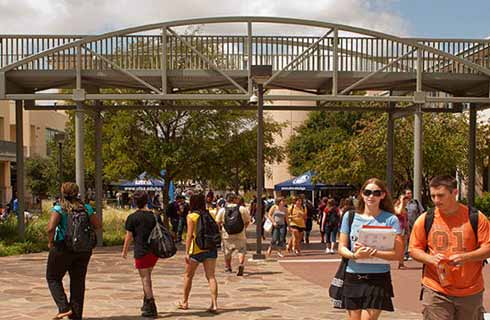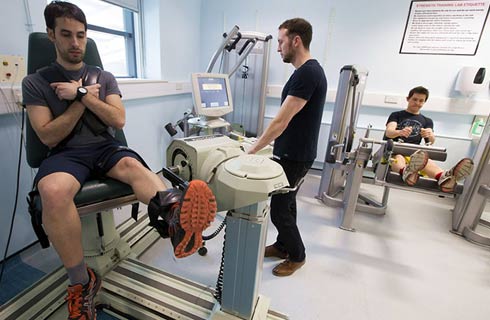地质学(荣誉)理学士学位
BSc (Hons) Geophysics

学历文凭
Bachelor Degree with Honours

专业院系
Earth Sciences

开学时间

课程时长

课程学费

国际学生入学条件
IDP—雅思考试联合主办方

雅思考试总分
6.5
- 雅思总分:6.5
- 托福网考总分:80
- 托福笔试总分:
- 其他语言考试:Pearson Academic PTE - 62 (with no less than 59 in each Communicative Skill) Cambridge C2 Proficiency or C1 Advanced - 176 with a minimum of 169 per component
CRICOS代码: F665
申请截止日期: 请与IDP联系 以获取详细信息。
课程简介
Gain the knowledge you need to understand how the Earth works. With this BSc you will learn how Earth systems interact and how data analysis and modelling future behaviours can help solve Earth Science problems.,Understanding the physical processes that control the materials, structure and dynamics of our planet is key to predicting the Earth’s future behaviour and mitigating the global challenges faced by society. Geophysics is essential to creating a more sustainable future for humanity through monitoring natural hazard risks, detecting resources and computer modelling to predict future behaviour. Our flexible Geophysics degree, puts you in control, giving you both the fundamentals and increased specialisation as you progress through the degree, allowing you to choose a pathway of most interest to you. Combining academic excellence and cutting-edge research, the course will equip you with the tools needed for employment in a range of sectors, including mineral exploration and extraction industries, in petroleum exploration companies, and with environmental and hydro-geological industries. The advanced quantitative skills developed during this course can provide a strong base for securing employment outside geoscience, for example, in finance, insurance and banking. You may be able to transfer to the four-year MSci degree in Earth Sciences at the end of your second year. The fourth year combines a bespoke research project in your specialism, with advanced modules designed to integrate your Earth Science knowledge for vocational andor research applications. You can also apply to add a placement year or a year abroad to your degree, increasing the course from three years to four.In the first year, you will gain a fundamental understanding of Earth Sciences, as well as developing university-level skills in Maths and Physics. Year 2 specialises in the geophysical methods associated with geophysical surveying, data analysis and mathematical modelling of Earth science processes. In Year 3, you will undertake a geophysical research dissertation and develop advanced knowledge in specialist geophysical topics of your choice with multiple residential field work opportunities.Course structureYear 1 modulesCore modules:Field Studies introduces techniques for description and interpretation of natural geological features. This module also covers mapping skills, and the observation, recording and processing techniques needed for fieldwork and imagery.Further Mathematics for Geoscientists ensures that you have the basic maths techniques needed to solve a range of numerical problems in the geosciences.Understanding Earth Sciences covers an introduction to the areas of petrology, sedimentology, structural geology and palaeontology and relates the processes to the plate tectonic cycle.Introductory Data Science introduces the fundamentals of data acquisition and analysis in a geoscientific context. You will learn how to apply computational tools to manipulate and visualise a range of scientific and geospatial data.Sustainability introduces global issues and concepts around sustainability, with an emphasis on aspects most relevant to Earth Sciences such as water, climate, energy and mineral resources, food resources, and natural hazards, and is thematically taught around the United Nations Sustainable Development Goals (SDGs).Optional modules:In recent years, optional modules have included: Earth MaterialsEnvironmental Earth ScienceYear 2 modulesCore modules:Geophysical Methods for Geoscientists introduces the main geophysical exploration methods and explains their application in understanding the geological structure of earth.Fieldwork (Geophysical) gives you hands-on experience of some widely used geophysical field methods used in geophysical surveys, in preparation for your dissertation project.
相关申请
 预科
预科 奖学金
奖学金 实习机会
实习机会 在校学习
在校学习 跨境学习
跨境学习 校园授课-线上开始
校园授课-线上开始 在线/远程学习
在线/远程学习
开学时间&学费
学费信息仅供参考,请与IDP联系以获取详细信息
| 开学时间 | 时长 | 学费 | 地点 |
|---|
学校排名

世界排名114
数据源:
泰晤士高等教育世界大学排名
关于杜伦大学

杜伦大学创建于1832年,是英国历史最悠久的大学之一。杜伦大学建于中世纪世界遗产地旁,有着悠久的历史和现代价值观,是一座备受推崇并拥有前瞻性思维的学府。如今,来自世界各地的18000多名学生在达勒姆就读。杜伦大学有28个系,开设有200多门本科和研究生课程。该校很多教师都处于各自领域的最前沿。教职人员利用出色的研究和学科知识为所有学生提供优质的教学。目前,杜伦大学有17个学科在全球大学中名列前100位,其中九个学科名列前50位。除了在学术上的卓越成就,该校还努力为学生提供支持,帮助他们在毕业后获得有意义的工作。其毕业生就业能力目前在世界上排名第88位。该校的就业与创业中心致力于培养学生的专业技能,并提供商业人脉和工作机会。杜伦大学目前在2020年《QS世界大学排名》中名列第78位,稳稳跻身全球大学百强之列。该校为教职人员和学生创造了一个热情友好的多元化社交环境,并因此而倍感自豪。目前,杜伦大学28%的在校生为非英国本土学生。大学社区处在独一无二的达勒姆求学体验的核心位置,达勒姆的每个社区均是多元化、多学科的社区,由来自不同背景和文化的学者、学生和工作人员组成。有了这些社区,加上该校杰出的支持体系,学生们一定会有宾至如归之感,并可参与大量精彩的课题。
本校相关课程

博士神学与宗教
学历文凭
Ph.D.
开学日期
课程费用总额


MLitt神学与宗教
学历文凭
Masters Degree (Taught)
开学日期
课程费用总额


博士学位论文博士学位
学历文凭
Ph.D.
开学日期
课程费用总额


理学硕士心理学研究
学历文凭
Masters Degree (Research)
开学日期
课程费用总额


研究心理学硕士
学历文凭
Masters Degree (Research)
开学日期
课程费用总额


博士哲学
学历文凭
Ph.D.
开学日期
课程费用总额

其他相关课程

MGeol(荣誉)地质科学(国际)
 利兹大学
利兹大学泰晤士高等教育世界大学排名:118
学历文凭
Undergraduate Masters
开学日期
课程费用总额


Bachelor of Commerce and Bachelor of Science - Earth Science [Extended Major]
 昆士兰大学
昆士兰大学泰晤士高等教育世界大学排名:80
学历文凭
Dual Degree
开学日期
课程费用总额


Bachelor of Advanced Science (Honours) -Coastal and Ocean Science
 昆士兰大学
昆士兰大学泰晤士高等教育世界大学排名:80
学历文凭
Bachelor Degree with Honours
开学日期
课程费用总额


荣誉理学士学位-萨塞克斯大学-国际学习中心
 Study Group学习集团(英国)
Study Group学习集团(英国)学历文凭
Bachelor Degree with Honours
开学日期
课程费用总额


理学硕士气候变化与国际发展
 东安格利亚大学
东安格利亚大学学历文凭
Masters Degree (Taught)
开学日期
课程费用总额


气象与气候科学(荣誉)理学士学位
 利兹大学
利兹大学泰晤士高等教育世界大学排名:118
学历文凭
Bachelor Degree with Honours
开学日期
课程费用总额










